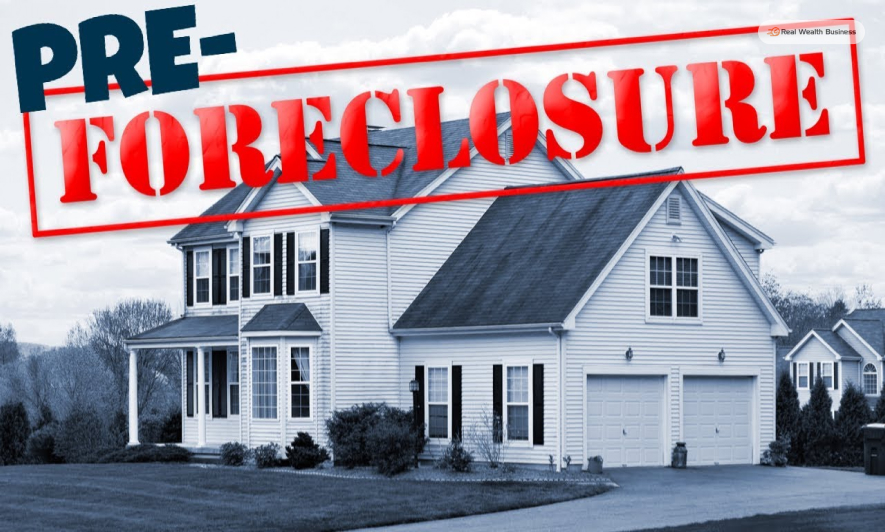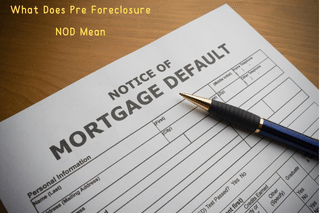Preforeclosure represents a critical juncture in the lifecycle of a mortgage, often associated with the onset of financial distress for homeowners. This term signifies the commencement of legal proceedings that could potentially lead to foreclosure if not appropriately addressed. The complexity and legalistic nature of preforeclosure can render it an intimidating concept for many individuals. Therefore, this article seeks to provide an elucidative exploration into the world of preforeclosure, demystifying its intricacies and offering guidance on how to navigate through this challenging period.
The subsequent sections will delve into an exhaustive understanding of preforeclosure, from its initiation process and legal implications to potential outcomes for both homeowners and prospective buyers. Additionally, readers will be introduced to various options available during this phase alongside strategies for maneuvering through these situations. In doing so, this article aims to equip homeowners with valuable knowledge that might aid them in averting adverse outcomes such as property loss or severe credit damage.
Understanding Preforeclosure
Preforeclosure, a critical phase in the foreclosure process, refers to the sell my house fast Fort Worth period when a homeowner has defaulted on their mortgage payments, but still retains the opportunity to avoid full foreclosure by either paying off the outstanding debt or selling the property. It is during this stage that homeowners often implement preforeclosure strategies in an attempt to salvage their situation. The preforeclosure timeline varies depending on several factors including state laws and individual lender policies; however, it typically begins after three months of missed mortgage payments and can last anywhere from 30 days to 120 days.
Understanding preforeclosure can be challenging due to its complex nature and potential legal implications. However, it is essential for homeowners navigating through this stage as it presents an opportunity for them not only to potentially save their home but also mitigate negative impacts on their credit score. Additionally, knowledge of preforeclosures mean can be beneficial for investors looking into the preforeclosure real estate market as properties in this phase often sell below market value due to distressed circumstances of owners eager to avoid full foreclosure.
Navigating preforeclosure as a home seller requires careful planning and strategic sell my house fast Texas decision-making. Homeowners need to promptly respond once they receive a notice of default from their lender by exploring possible solutions such as loan modification or short sale among others. The decisions made within this critical time frame will significantly influence whether they can prevent heading into full-blown foreclosure or not – hence making the understanding of preforeclosures crucial. This overview provides some insight into how one might navigate through these challenges which leads directly into discussing ‘the initial process’ involved during this precarious period without explicitly using the term ‘step’.
The Initial Process
The initial process refers to the stage in which a property owner has defaulted on their mortgage payments, leading their lender to issue a formal warning of intent to foreclose. This marks the beginning of what is known as preforeclosure, an event that prompts homeowners to seek out preforeclosure help for homeowners. The primary goal of this assistance is to provide strategies and resources that can potentially prevent or halt foreclosure proceedings. In understanding ‘what does preforeclosure mean’, it’s critical for homeowners facing such circumstances not only recognize the gravity of their situation but also grasp the importance of swift action during this crucial period.
At this point, preforeclosure buying opportunities may present themselves as investors and potential buyers become aware of properties with impending foreclosure status. These opportunities are often attractive due to the possibility of acquiring properties at below-market prices, with buyers typically conducting due diligence on both the property condition and any existing liens against it before proceeding with negotiations. Concurrently, some homeowners may opt for a preforeclosure short sale process wherein they sell their home for less than what they owe on their mortgage with lender approval. This strategy serves as an alternative method aimed at alleviating financial burdens while avoiding further damage to credit scores.
However, navigating these options requires careful consideration and understanding due to associated legal implications that could considerably affect all parties involved in future transactions or litigation processes. For instance, failing to properly navigate through these complexities could lead owners into further financial distress or result in potential buyers facing unforeseen legal issues post-acquisition. Therefore, comprehending every aspect related to ‘what does preforeclosure mean’ becomes imperative during this initial phase before diving deeper into its other facets like legal implications.
Legal Implications
Understanding the legal implications associated with preforeclosure is crucial, as these can significantly impact both homeowners and potential buyers. When a homeowner fails to meet their mortgage obligations, lenders have the right to initiate a foreclosure process. However, during the preforeclosure period, which starts when the first missed payment notice is issued and ends when the property is sold at auction, homeowners still have control over their property. They can sell the house before foreclosure to avoid further damage to their credit rating. This process of selling in order to prevent foreclosure with a quick sale often becomes an appealing option for many distressed homeowners.

In the context of legal implications, it is essential to differentiate between foreclosure and quick sale. Foreclosure refers to a lengthy legal process initiated by lenders due to non-payment of mortgage dues wherein they seize possession of your home and subsequently sell it off in an auction or sheriff’s sale. Conversely, a quick sale involves selling your home below market value before completion of foreclosure proceedings – essentially you sell house to avoid foreclosure. Notably, though both methods result in loss of property rights for homeowners; however, they differ significantly in terms of credit damage, financial consequences and psychological effects.
The legal intricacies surrounding preforeclosure processes underscore why understanding such nuances are vital for decision-making strategies for homeowners facing financial distress related with mortgages. Delving into these options allows individuals not only mitigate some damages but also retain more control over their financial situation than if they were purely at mercy of lender-driven foreclosure proceedings. Exploring this further will lead us into discussing on ‘homeowner’s options’ that are available during this daunting phase.
Homeowner’s Options
Several alternatives exist for homeowners during the preforeclosure phase, allowing them to navigate this challenging period with more control and potentially less damage to their credit score. One such alternative is selling the house in preforeclosure. A quick sale during this phase can be significantly beneficial as it can prevent a foreclosure from appearing on the homeowner’s credit report. This course of action necessitates strategic planning and effective marketing strategies, considering tips for selling a house in preforeclosure.
To sell a house under preforeclosure stress means that the homeowner must take proactive steps to ensure they receive an offer that at least covers what they owe on their mortgage. This often involves having open communication with their lender about their situation, preparing the property for viewings, pricing it competitively in accordance with its market value, and engaging potential buyers effectively. The goal is not just to sell quickly but also at a price that mitigates loss. The benefits of selling before foreclosure are myriad: it can reduce further financial burden, protect credit scores from taking severe hits due to foreclosure reports and provide some degree of financial relief.
While achieving fast sales may seem daunting under these circumstances, many resources and services aim specifically at helping homeowners navigate through these complex situations successfully. Stop foreclosure through fast sale methods becomes possible when utilizing professional guidance and leveraging available resources optimally. Furthermore, such transactions present opportunities not only for distressed homeowners but also prospective buyers interested in affordable properties or investment projects—an aspect which will be examined closely in the subsequent section concerning buyer’s opportunities.
Buyer’s Opportunities
Buying a property in the preforeclosure stage presents unique opportunities for prospective investors and homebuyers. With the homeowner facing foreclosure, they may be more willing to consider fast house sale options that allow them to avoid the negative financial implications and credit damage associated with foreclosure. As such, potential buyers are given an opportunity to negotiate directly with homeowners offering mutually beneficial terms.

- Price Advantage: Properties in preforeclosure often come at a lower price point as homeowners aim for how to sell their house quickly. This provides the chance for buyers to acquire properties below market value.
- Negotiation Power: Because of the urgency of fast house selling strategies, buyers have greater bargaining power during negotiations.
- Profit Potential: For investors, purchasing a preforeclosure property can yield significant profits after renovation and resale or rental.
- Less Competition: Many potential buyers are unaware of preforeclosure sales or lack knowledge on how to navigate these transactions, resulting in less competition compared to traditional real estate markets.
Making use of these opportunities allows prospective buyers and investors not only access to potentially profitable deals but also contributes positively towards alleviating distressed homeowners’ situations by providing viable alternatives to foreclosure. However, it is crucial that one understands fully the process involved in buying such properties as well as comprehends both legal and ethical implications before proceeding further into this specialized area of real estate investment.
An understanding of what follows from here is pivotal; thus moving forward would require delving deeper into navigating through this intricate process without using any ‘steps’. A subsequent discussion will focus on this aspect – making sense of how one navigates through a preforeclosure purchase effectively while ensuring all parties involved benefit fairly from it.
Navigating the Process
Navigating through the intricacies of a preforeclosure purchase necessitates careful planning and comprehensive knowledge of legal procedures, ensuring a fair transaction for all parties involved. This process often involves researching public records to identify properties that are in preforeclosure status, getting in touch with the homeowner, negotiating terms for the sale, and arranging necessary financing. It is crucial to approach this process with diligence as there may be unforeseen issues such as liens on the property or hidden repair costs that could complicate matters.

The negotiation stage is particularly critical in securing a mutually beneficial deal. Prospective buyers should obtain an accurate appraisal of the property’s value from an objective third party before presenting their offer to homeowners who might be under financial stress due to impending foreclosure. A well-informed decision can protect buyers from overpaying while offering homeowners a fair chance to mitigate their losses. It’s also advisable for purchasers to secure legal counsel specializing in real estate transactions, which can provide expert advice during negotiations and help navigate complex regulatory requirements.
Managing these elements successfully paves the way for transitioning towards finalizing the purchase agreement. The completion phase involves signing contracts, transferring ownership rights through deed recording, and settling financial obligations at closing among other things. However, it is important not just to focus on reaching this milestone but also preparing for what lies beyond it – resolving any remaining issues after acquisition. This can include dealing with repairs or renovations needed on the property or addressing any remaining liens or encumbrances that were not cleared during preforeclosure proceedings. The subsequent section will delve deeper into managing these final resolution aspects following a successful preforeclosure purchase.
Final Resolution
Upon successful completion of a preforeclosure purchase, the focus then shifts to addressing outstanding concerns and settling any residual issues that may impact the newly acquired property. This process involves dealing with any remaining liens or encumbrances on the property’s title, managing potential tax implications related to the purchase, and implementing strategies for maximizing return on investment. The objective is to ensure that all legalities are properly addressed and that ownership rights are securely transferred.
Several critical steps should be undertaken in this final resolution phase:
- Conducting a thorough title search: This step ensures there are no undisclosed liens or claims against the property.
- Consulting with a tax professional: To get an understanding of possible tax liabilities associated with purchasing a preforeclosed home.
- Developing an effective property management strategy: This includes decisions about whether to sell, rent out, or live in the purchased property based on market conditions and personal financial goals.
The ultimate goal during this final phase is risk mitigation and value optimization. It is essential to conduct due diligence regarding all aspects of the acquisition process to avoid unexpected complications down the line. A key aspect of this stage involves carefully reviewing all transaction documentation before closing. By doing so, it can help prevent potential disputes related to previous ownership or existing obligations tied to the property’s history. Through meticulous planning and execution during this concluding phase of preforeclosure purchase, investors can potentially secure a beneficial outcome from their real estate venture without unnecessary legal entanglements or financial burdens.
Frequently Asked Questions
What are common emotional impacts on homeowners going through preforeclosure?
Homeowners undergoing preforeclosure often experience emotional distress, including anxiety and depression. This can stem from financial instability, potential loss of residence, social stigma, and the complex foreclosure process itself.
How does preforeclosure affect a homeowner’s credit score and future borrowing capabilities?
Preforeclosure significantly impacts a homeowner’s credit score, often reducing it by 85-160 points. This decrease impairs future borrowing capabilities, as lenders may deem the borrower risky due to their adverse credit history.
Can a homeowner still live in the property during the preforeclosure period?
During the preforeclosure period, it is permissible for homeowners to reside in their property. This phase allows time for potential loan adjustments or sale of the property prior to a full foreclosure process.
Are there any tax implications for the homeowner during or after preforeclosure?
During or after preforeclosure, homeowners may face tax implications. The cancellation of debt can be considered taxable income. However, under certain circumstances, the Mortgage Forgiveness Debt Relief Act may provide an exemption.
Could a preforeclosure lead to a short sale of the property?
Yes, a preforeclosure could potentially lead to a short sale of the property. This occurs when the homeowner sells their property for less than the outstanding mortgage balance, often as a means to avoid foreclosure.
Other Articles You Might Enjoy
What Does Under Contract Mean In Real Estate

